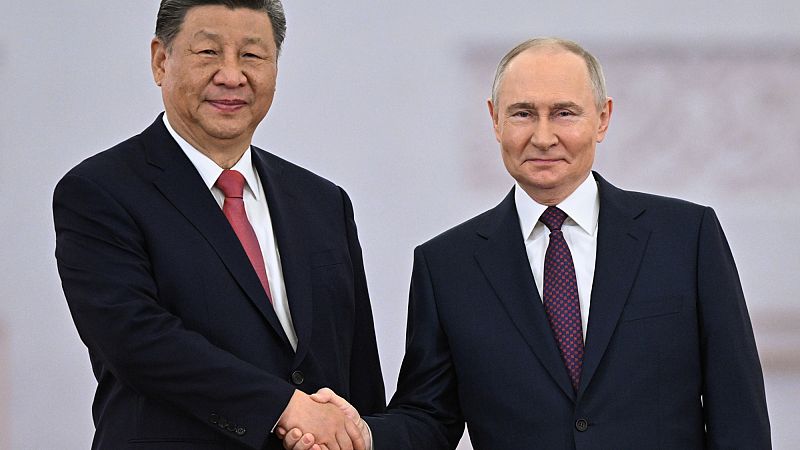Russian President Vladimir Putin and Chinese President Xi Jinping convened in Moscow on Thursday to strengthen and broaden their “strategic partnership” amid escalating pressures from the West.
At a high-profile summit occurring during Russia’s Victory Day festivities, both leaders endorsed a collaborative declaration aiming to substantially increase trade and investments by 2030. This accord details ambitions to strengthen their economic relationship through boosting the proportion of advanced technology items traded, formulating innovative online commerce approaches, and improving reciprocal deliveries of essential materials like minerals and farm produce.
“In our joint statement with President Xi Jinping, we have set ambitious goals,” Putin said.
“It concerns ensuring significant and qualitative progress in Russian-Chinese trade and investment… and improving the structure of economic ties by raising the share of high-tech products.”
For his part, Xi highlighted a more extensive geopolitical perspective, presenting the enhanced collaboration as a collective stance against what he described as an increasing global tendency towards “unilateralism and bully tactics.”
“China will, together with Russia, shoulder the responsibilities of world powers,” Xi said.
We will maintain an accurate perspective on World War II history, respect the UN’s authority, and steadfastly protect the interests of developing nations. In unison, we shall advance a multi-polar global order and equitable economic globalization.
Xi arrived in Moscow on Wednesday for a four-day visit, during which he will attend commemorative events and hold further talks with Russian leadership. The visit underscores Beijing’s increasingly public backing of Moscow, which has come under heavy Western sanctions and diplomatic isolation since its full-scale invasion of Ukraine in 2022.
China has not supplied arms to Russia but has become an essential economic ally, especially within the energy industry. China currently constitutes one of the biggest buyers of Russian petroleum and natural gas, with these sales aiding the government’s finances during wartime spending.
Furthermore, Beijing has emerged as Moscow’s primary source for machinery and electronic goods following Western sanctions that restricted Russia’s ability to import many advanced technologies. These supplies have aided in sustaining Russia’s military-industrial sector despite the tightening of international supply chains.
In recent years, Putin and Xi have met more than forty times, cultivating an exceptionally strong personal and political relationship. This burgeoning collaboration encompasses various areas such as economics, politics, and strategy, extending into multilateral entities like BRICS, which has grown from its original membership to incorporate additional developing countries.
While Beijing continues to insist on neutrality in the Ukraine conflict, it has repeatedly echoed Kremlin narratives, blaming NATO and Western powers for provoking Russia. Moscow, in turn, has offered unambiguous support for China’s positions on Taiwan and other core sovereignty issues.
Although they refer to their bond as a “no limits partnership,” this relationship has sparked concern among government officials in Western countries who see the alliance between Moscow and Beijing as a significant long-term threat to the global structure established after World War II.
In the meantime, unverified reports from Ukraine claimed that two individuals of Chinese origin were apprehended while battling alongside Russian forces, suggesting that possibly more than 150 additional Chinese nationals could be functioning as mercenaries. The Chinese government refuted any official participation, asserting that they advise their citizens against participating in overseas combat situations.






